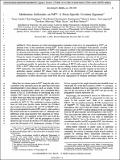Por favor, use este identificador para citar o enlazar a este item:
http://hdl.handle.net/10261/9027COMPARTIR / EXPORTAR:
 SHARE
BASE SHARE
BASE
|
|
| Visualizar otros formatos: MARC | Dublin Core | RDF | ORE | MODS | METS | DIDL | DATACITE | |

| Título: | Methionine sulfoxides on PrPSc: A prion specific covalent signature |
Autor: | Canello, Tamar; Engelstein, Roni; Moshel, Ofra; Xanthopoulos, Konstantinos; Juanes, Maria E. CSIC; Langeveld, Jan; Sklaviadis, Theodorus; Gasset, M. CSIC ORCID; Gabizon, Ruth | Palabras clave: | prion protein prion methionine oxidation covalent modification |
Fecha de publicación: | 26-ago-2008 | Editor: | American Chemical Society | Citación: | Biochemistry. 2008 Aug 26;47(34):8866-73. Epub 2008 Aug 5. | Resumen: | Prion diseases are fatal neurodegenerative disorders believed to be transmitted by PrPSc, an aberrant form of the membrane protein PrPC. In the absence of an established form-specific covalent difference, the infectious properties of PrPSc were uniquely ascribed to the self-perpetuation properties of its aberrant fold. Previous sequencing of the PrP chain isolated from PrP27-30 showed the oxidation of some methionine residues, however at that time these findings were ascribed to experimental limitations. Using the unique recognition properties of αPrP mAb IPC2, protein chemistry and state of the art mass spectrometry, we now show that while a large fraction of the methionine residues in brain PrPSc are present as methionine sulfoxides this modification could not be found on brain PrPC as well as on its recombinant models. In particular, the pattern of oxidation of M213 as related to the glycosylation at N181 of PrPSc differs both within and between species, adding another diversity factor to the structure of PrPSc molecules. Our results pave the way for the production of prion specific reagents in the form of antibodies against oxidized PrP chains which can serve for the development of both diagnostic and therapeutic strategies. In addition, we hypothesize that the accumulation of PrPSc and thereafter the pathogenesis of prion disease may result from the poor degradation of oxidized aberrantly folded PrP. | Versión del editor: | http://www.ncbi.nlm.nih.gov/pubmed/18680312?ordinalpos=2&itool=EntrezSystem2.PEntrez.Pubmed.Pubmed_ResultsPanel.Pubmed_DefaultReportPanel.Pubmed_RVDocSum | URI: | http://hdl.handle.net/10261/9027 |
| Aparece en las colecciones: | (IQF) Artículos |
Ficheros en este ítem:
| Fichero | Descripción | Tamaño | Formato | |
|---|---|---|---|---|
| galleyBiochemistry.pdf | 3,92 MB | Adobe PDF |  Visualizar/Abrir |
CORE Recommender
Page view(s)
357
checked on 24-abr-2024
Download(s)
408
checked on 24-abr-2024
Google ScholarTM
Check
NOTA: Los ítems de Digital.CSIC están protegidos por copyright, con todos los derechos reservados, a menos que se indique lo contrario.
